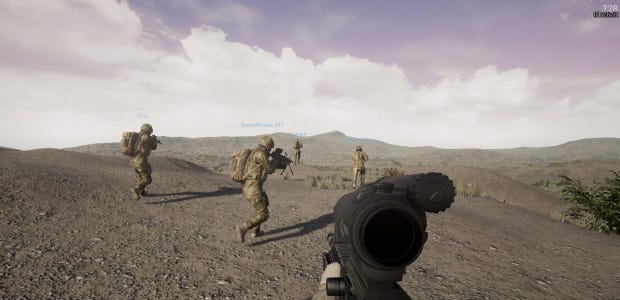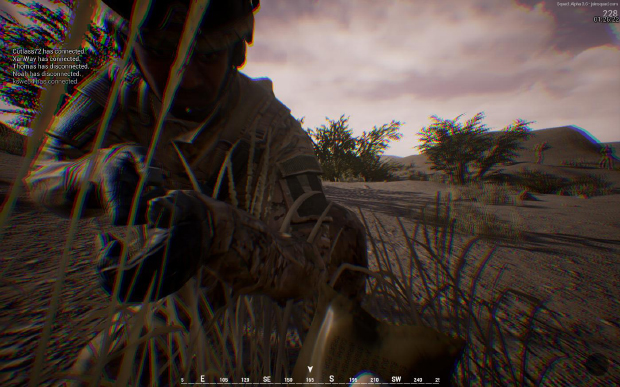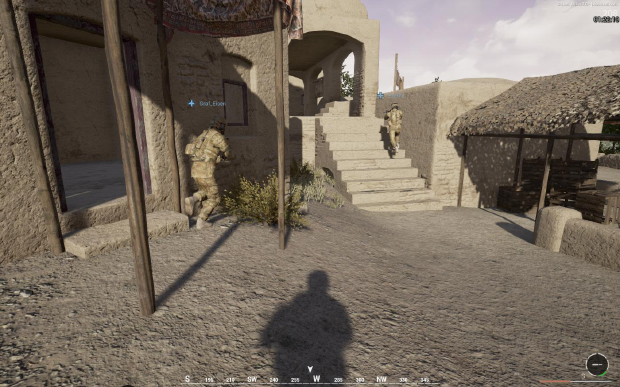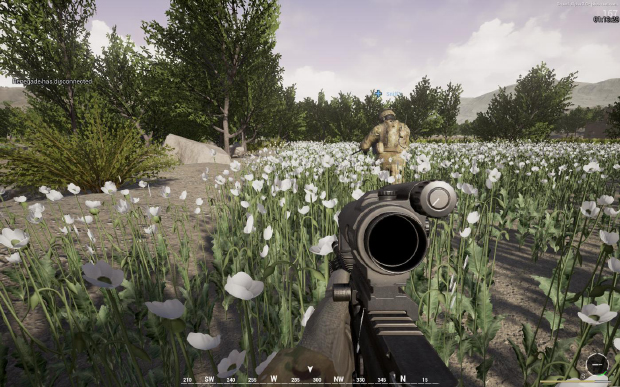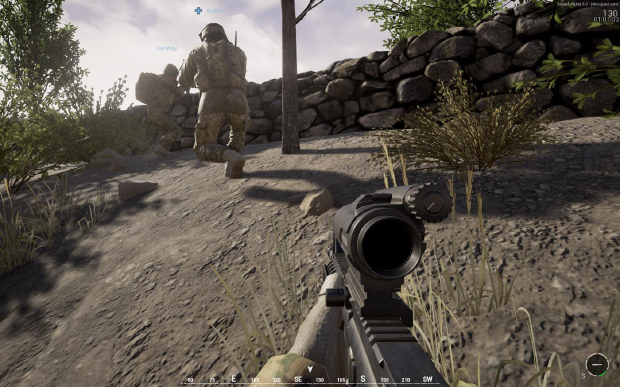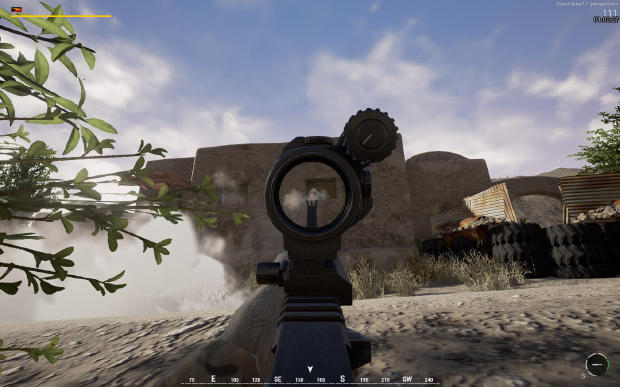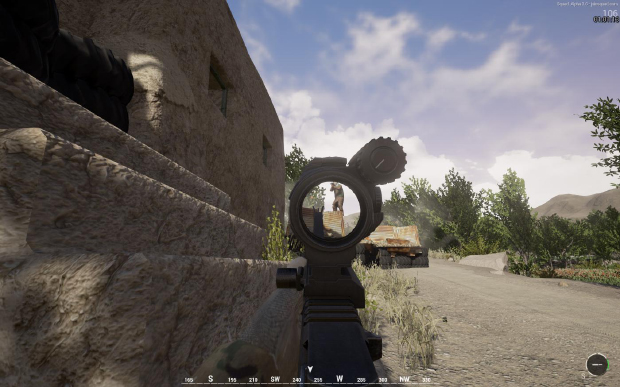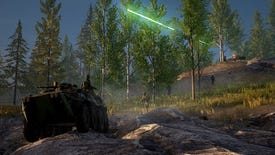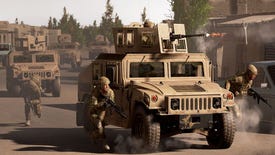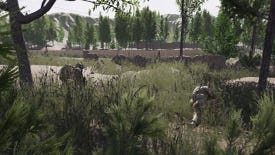Premature Evaluation: Squad
Afghan wig-outs
Each week Marsh Davies is Oscar Mike to the FOB that is Early Access and tries to find at least one thing that isn’t FUBAR. This week he’s been taking on tangos in Squad, a large-scale military shooter which claims to be the spiritual successor to the Battlefield 2 mod Project Reality.
I wonder if generations to come will recognise the universal theme tune of our current misadventures in the middle east. You know the one. You could probably hum it by now: a plangent brass section, now the Pentagon-approved accompaniment to American sacrifice, intercut with women singing “ooo” in a double harmonic scale, the eternal soundtrack of all countries southeast of Turkey. The particular country I’ve been spending time in is Afghanistan, and it’s quite realistic here - but not too realistic: a constraint not just of budget but also intent. Squad seeks to split the difference between Arma and Battlefield: the sober simulation of former, albeit thinner featured, with the greater immediacy and game-modes of the latter.
It sounds like a winning blend to me. I’ve always found Arma a little over-encumbered with the fussiness of its many possibilities; the effort to account for a huge breadth of interaction undercuts the ease and finesse of any one experience. Meanwhile, recent Battlefield games - partly a victim of their own success - have veered further towards run-n-gun fun without the time or space for the articulation of strategy. Squad, I think, does a decent job of straddling the middle-ground, even though many features, like vehicles and reliably operable deployment interfaces, are yet to be implemented. Weapons behave with supposed realism (I wouldn’t know) but downed colleagues can be relatively easily revived. Strategy emerges from the game’s particular approach to squad-spawning: squad leaders have to build spawn points to ensure that your frontline is fed with a regular supply of new bodies. These dissolve when contested, preventing teams from simply dropping a gunman-spewing spawn-point on the enemy’s doorstep and meaning that the spawn points need to be placed with some considerable thought: close enough to the fray that they give your forces forward momentum, but not so close that any loss of ground will wipe them from the field. Of course, different squads will have to coordinate their strategies to good effect, pincering enemies or driving at a single point en masse.
Discounting the (not terribly instructive) training mode, there are three types of match. Advance and Secure, in which the two teams are engaged in a tug of war over a linear sequence of capture points, will be familiar to Battlefield players. It, like its analogue in Battlefield, runs on a ticket system, whereby the teams exhaust a finite number of respawns. Then there’s Insurgency, which sets one team on the hunt to destroy five weapons caches, the locations of which are only revealed as you kill enemies. The other team wins by either protecting these caches for the time limit or depleting the tickets of the opposing team. The final mode sees the US forces try to capture a number of locations in any order - which are then permanently in their possession. The defenders must dig in and try to outlast the assault.
This last is the mode I first try, foolishly joining a squad which seems not to have set up any forward spawn point, so a dozen of us end up plopping onto a small hillside a good trek away from our objectives. I wait for someone to show leadership. Someone shows us a grenade instead, detonating it right among all the newly spawned recruits.
“Oh what a dickhead,” says someone wearily, before discussing how to kickban the perpetrator. Luckily I was just far enough away from the blast that I am only wounded. My view throbs red, but I’m otherwise unimpaired. A medic called Graf_Eisen comes over and stands over me, entirely still, hands gnarled as though holding an invisible gun. A little medicine symbol turns from red to green at the bottom of the screen and I’m good to go. Arma this ain’t, for which I am somewhat thankful given the presence of teamkilling jebends.
“Let’s kill us some rag-heads,” says someone in a mock-Texan drawl, reminding me why I hate playing games with open comms. I worry that this may become a recurring theme. We trundle through some scrubland and then down a road which winds into a valley, before veering off the tarmac and over a hillock. Somebody shoots me in the back, but doesn’t kill me, and Graf_Eisen patiently heals me again. I worry that this may become a recurring theme. One of my colleagues turns back to unleash a volley of bullets back up the hill, but I can’t see anyone there.
While being healed, most of the folks I was with have run off, leaving me and a handful of stragglers, none of whom are audibly ironic racists. I stick with Graf_Eisen and another soldier with the curiously apostrophised name Sniff’s, which makes him sound a bit like one of those birds named after 19th century naturalists, like a Wilson’s Warbler. Together, we crest a hill and move cautiously down into a village. Gunfire can now be heard, but it’s hard to tell exactly where it’s coming from - though the cracks are loud, they don’t have the distortion I heard when bullets were coming directly at me. I assume we are temporarily safe. We pass a guy with some sort of heavier belt-fed gun, firing long bursts at nothing I can easily identify, but as we come further down the mountainside, I can see tracer fire zipping back and forth across the township below, red and green. Tiny pixel shivers suggest movement on the hillside above the town.
We press down further. It takes some time. Sniff’s, Graf_Eisen and myself move through a village, cautiously poking through doorways. I quietly wonder why we are doing this: the fight is still very audibly somewhere else - but I’m almost immediately chastened when Sniff’s trots down some steps and is filled full of bullets. Judging by the puffs of dirt that exploded from the wall beside him, the bullets came from broadly the same direction of our spawn. Graf_Eisen and I huddle in the shelter of an alleyway, momentarily uncertain of how to avoid exposing ourselves to fire. I double back a bit to see if I can spot the shooter, but there’s no one visible, so I return, finding Graf_Eisen patting Sniff’s back to health - it seems that as long as you have a doctor nearby, even death is impermanent.
We proceed, with more caution now, scuttling through a field of tall flowers and over a ditch. We are near to the fighting and some tracer fire scuds alarmingly close - but I don’t think we’ve been spotted. We rise out of an irrigation ditch at the edge of a field and up the embankment towards a low wall. Sniff’s fires over the top and bullets are returned. I peak over and instantly take a bullet to the face. Graf_Eisen revives me, and by the time he does, Sniff’s is leaping gallantly over the wall with another soldier. I lean over to provide cover fire, but I can’t really see anything - the view of the buildings ahead is largely obscured by a row of trees - so I bundle over the wall as well, crouching and crawling towards them through the undergrowth. The gunfire is thunderous now. I find Sniff’s body a few moments later.
I attempt to revive Sniff’s with a field dressing, but it appears that this is either insufficient or he has elected to respawn rather than wait for a medic. Graf_Eisen has dematerialised, it seems, and I am alone. Happily, no one seems to be firing at me, and I’m able to crawl right up to the buildings. The shrubs give way to a road and then a makeshift barricade. I see glimpses of men with headscarves. One pops up in a window of a nearby house and, after I get over my momentary surprise at not instantly dying, as is my normal experience in these sorts of games, I shoot him in the brain. Smoke seems to be billowing up from somewhere now and I use this cover to dash across the road to be in the shadow of the building. As it clears, a chap with a neckerchief rounds the corner, and I kill him quite deftly, probably setting some personal record for survival in hardcore military shooters. There’s a lot of activity just the other side of the barricade, but I don’t appear to have any allies near me, so I decide to throw my life away in a pointless display of bravado, taking out one man before his friends cut me down.
A bug prevents me from respawning, so I try a server hosting an Advance and Secure game. This isn’t as populated as the previous game and there are fewer squads to pick from - none of which seem to have put down spawn points. I join one and spend a good deal of time traipsing after them as they move further and further away from the initial spawn. The squad leader, a guy with a Midlands accent makes it clear we have to be active on microphone or get kicked. Unfortunately, mine isn’t working in the game for reasons I can’t divine. It’s working in every other application - I’ve just been recording some VO for a video and chatting over Discord - and it’s set as the default microphone. Nonetheless Mr Midlands goes off on a spectacularly supercilious and aggressive rant about how morons like me are ruining the game by being so clueless. I’m used to people blowing their top in games, but this guy’s just showboating to a captive audience - and somehow this is way more annoying than the usual stream of invective. Apparently I should stop “twatting about in the North like a cunt” and stick with the Squad. “The clue’s in the title,” this grown adult male splutters sarcastically at someone who can’t even audibly retort, perhaps forgetting that the squad did not wait for me to join them before moving onwards, multiple times, and that the city is unsurprisingly unfamiliar to me, forcing me to frequently stop and check my map for our relative positions. I am exceedingly polite as I explain the situation to him over text, but this is nonetheless one of the biggest pillocks I have encountered in any game. The kind of guy whose claim upon even this iota of ersatz power is so profoundly desperate that you would truly pity him if you didn’t have to listen to his awful barking as well - and for that reason alone I omit his name here.
I don’t think our squad is bonding.
Anyway, in an effort not to waste more of the Midlands Militia’s valuable time as he plays internet games at 11.30am on a Friday, I quit out, hoping a reboot might get the game to pick up my mic. But then, somehow I don’t feel inspired to rejoin again.
I quite like Squad though, even if I didn’t like that squad. People I meet in subsequent matches are much more polite and helpful, and I find the game sufficiently thoughtful and severe that I am inspired to care a lot more about any given life. Even if it remained infantry-only, I could see this finding a happy home for itself between Arma and Battlefield, and forthcoming features sound like they will multiply the vectors by which you can assault the enemy; forward spawn points will need to be maintained by supply lines, which themselves can be destroyed, for example. Vehicles, too, will no doubt change the dynamics of battle, but the real test will be how its community suffers new players and neerdowells both. I suspect some of Squad’s players could do more to win hearts and minds.
Squad is available from Steam for the high-ish price of £30. I played the version with the content Build ID 899017.
